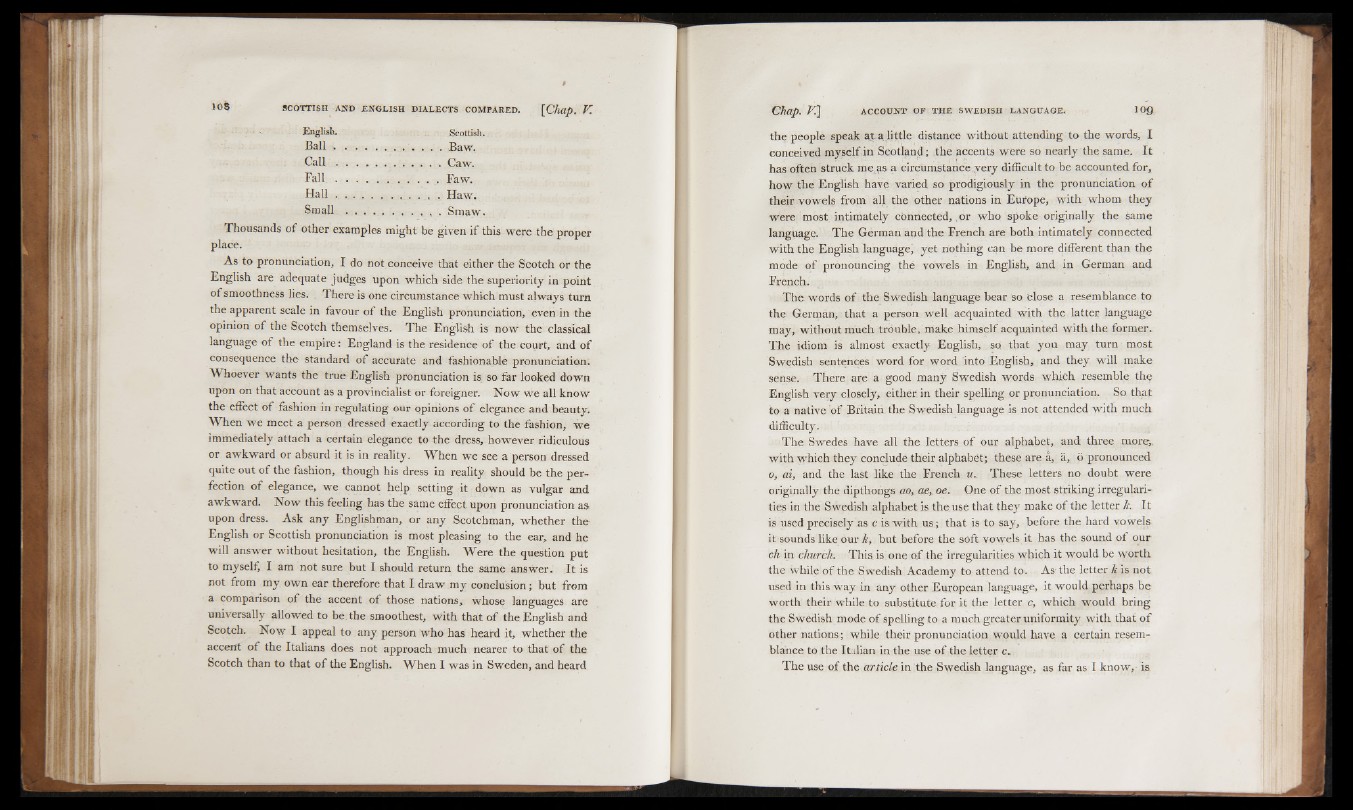
English. Scottish.
Ball ..................................Baw.
C a l l ................... . . . . » Caw.
F a l l ................. Faw.
Hall , Haw.
S m a l l ................... . , , , Smaw.
Thousands o f other examples might be given if this were the proper
place.
As to pronunciation, I do not conceive that either the Scotch or the
English are adequate judges upon which side the superiority in point
o f smoothness lies. , There is one circumstance which must always turn
the apparent scale in favour of the English pronunciation, even in the
opinion of the Scotch themselves. The English is now the classical
language of the empire: England is the residence of the court, and of
consequence the standard of accurate and fashionable pronunciation.
Whoever wants the true English pronunciation is so far looked down
upon on that account as a provincialist or foreigner. Now we all know
the effect of fashion in regulating our opinions o f elegance and beauty.
When we meet a person dressed exactly according to the fashion, we
immediately attach a certain elegance to the dress, however ridiculous
or awkward or absurd it is in reality. When we see a'person dressed
quite out of the fashion, though his dress in reality should be the perfection
of elegance, we cannot help setting it down as vulgar and
awkward. Now this feeling has the same effect upon pronunciation as.
upon dress. Ask any Englishman, or any Scotchman, whether the
English or Scottish pronunciation is most pleasing to the ear, and he
will answer without hesitation, the English. Were the question put
to myself, I am not sure but I should return the same answer. It is
not from my own ear therefore that I draw my conclusion; but from
a comparison o f the accent of those nations, whose languages are
universally allowed to be. the smoothest, with that o f the English and
Scotch. Now I appeal to any person who has heard it, whether the
accent o f the Italians does not approach much nearer to that o f the
Scotch than to that of the English. When I was in Sweden, and heard
the people speak at a little distance without attending to the words, I
conceived my self in Scotland; the accents were so nearly the same. It
has often struck me,as a circumstance.,very difficult to be accounted for,
how the English have varied so prodigiously in the pronunciation of
their vowels from all the other nations in Europe, with whom they
were most intimately connected,, or who spoke originally the same
language. The German and the French are both intimately connected
with the English language, yet nothing can be more different than the
mode o f pronouncing the vowels in English, and in German and
French.
The words o f the Swedish language bear so close a resemblance to
the German, that a person well acquainted with the latter language
may, without much trouble, make himself acquainted with the former.
The idiom is almost exactly English, so that you may turn most
Swedish sentences word for word into English, and they will make
sense. There are a good many Swedish words which resemble the
English very closely, either in their spelling or pronunciation. So that
to a native of Britain the Swedish language is not attended with much
difficulty.
The Swedes have all the letters o f our alphabet, and three more,
with which they conclude their alphabet; these are a, a, o pronounced
0, ai, and the last like the French u. These letters no doubt were
originally the dipthongs ao, ae, oe. One of the most striking irregularities
in the Swedish alphahet is the use that they make o f the letter k. It
is used precisely as e is with us; that is to say, before the hard vowels
it sounds like our A, but before the soft vowels it has the sound o f our
ch in church. This is one o f the irregularities which it would be worth
the while of the Swedish Academy to attend to. As the letter A is not
used in this way in any other European language, it would perhaps be
worth their while to substitute for it the letter c, which would bring
the Swedish mode of spelling to a much greater uniformity with that o f
other nations; while their pronunciation would have a certain resemblance
to the Italian in the use o f the letter c.
The use of the article in the Swedish language, as far as I know, is